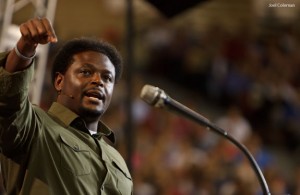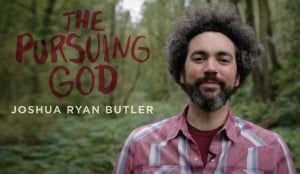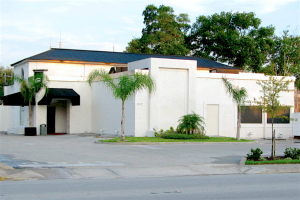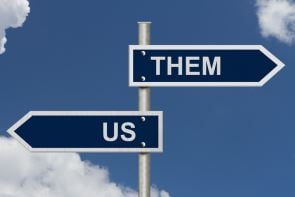I’m very excited to interview my friend Derwin Gray! Derwin is a pastor, writer, ex- NFL football player, and the founder of Transformation Church—a multiethinic mega-church in North and South Carolina. Derwin is also the author of the recently released The High-Definition Leader, which challenges pastors and leaders to see the importance of multiethnic communities.
NFL football player, and the founder of Transformation Church—a multiethinic mega-church in North and South Carolina. Derwin is also the author of the recently released The High-Definition Leader, which challenges pastors and leaders to see the importance of multiethnic communities.
Derwin, thanks for letting me ask you some questions on my blog!
PS: Why don’t you first give us a brief summary of your new book, The High Definition Leader?
DG: I wrote The High-Definition Leader because Jesus is calling local churches in America and the world to be communities of unifiers and reconcilers, not dividers. Jesus’ epic work through his sinless life, atoning death, resurrection, and ascension, and the sending of the Spirit, was so that God could have an ethnically diverse family of Jews and Gentiles. This new family called the church becomes a picture of God’s family in eternity on earth (Rev. 5:9-12).
My book will equip pastors and leaders to embody the Apostle’ ministry of reconciliation. Preeminent New Testament scholar, Scot McKnight says this about the local church: “God’s desire is for us to experience multi-ethnic fellowship now in the local church as it will be for eternity. God’s heart is total reconciliation.”
PS: Can you give us some statistics about the racial and/or socio-economic homogeny that exists in the American church today?
DG: Only 13.7% of churches in America are consider multiethnic. This means that 86.3 % of churches are homogenous. Sociologist Dr. Michael Emerson consider a local church multiethnic if one ethnicity does not make up 80% of the congregation. Local churches are ten times more segregated than the neighborhoods they are in and they are twenty times more segregated than the schools than the nearby schools.
This lack of gospel-diversity reproduce inequality, encourage oppression, strengthen ethnic division, heighten political separation, and causes the church to lose credibility.
PS: Would you say that multiethnic churches is a “gospel issue” or a secondary issue that’s not essential to the faith?
DG: Yes, the building of local multiethnic churches is a gospel issue because the gospel Paul preached produced local multiethnic churches throughout the Roman Empire (Eph. 3:1-13). In Ephesians 2:14-22, Paul says the work of Jesus, through his body on the cross accomplishes the following:
1) “Broke down” the dividing wall which separated Jews and Gentiles.
2) “Created a new humanity” made of Jews and Gentiles.
3) “Reconciled” Jews and Gentiles into “one body,” who are nor “Saint’s” and members of the same “household,” and the very Temple of God.
4) God’s “eternal purpose,” has always been for his multicolored “(manifold) wisdom” to be displayed the “church”, which for Paul was a local body of Jews and Gentiles, which “realized” through Christ (Eph. 3:1-13).
I’m particularly interested in how you’ve seen multiethnic diversity shape discipleship. Would you say that such diversity helps shape better, more “Jesus-like,” disciples than what we find in homogenous churches?
Discipleship and cross-cultural ministry matter to Jesus. After Jesus defeated sin, death, and evil, He brought into being a new society, a new people of God made up of Jews and Gentiles. At Transformation Church, we’ve found that ethnic diversity moves our congregation out of an individualistic understanding of discipleship into more of a communal, sacrificial understanding of discipleship.
PS: I’d love for you to expand on that last point a bit more. How exactly does multiethnic diversity contribute to one’s growth in Christ? And how to homogenous churches miss out on this growth?
DG: The beauty found in Colossians 3:12-17 is an amazing portrait of what redemptive relationships look like in community. However, Paul communicates this kind of community being formed in the midst of an ethnically diverse local church in Colossae; “Here there is not Greek and Jew, circumcised and uncircumcised, barbarian, Scythian, slave, free; but Christ is all, and in all” (Colossians 3:11ESV). These churches were ethnically diverse (Greek & Jew) and socio-economical diversity (Free and slave).
We’ve learned to listen to each other’s stories, share each other’s pain, and learn from people whose ethnicity and socio-economic, as well gender perspectives. This open up a whole new world to us in understanding the church, the gospel, and discipleship.
PS: I’ve always said that local churches should reflect the general diversity that we see in their surrounding communities. So, if a city is like 80% white, then the churches should roughly be 80% white. But if the city is much more diverse, then the churches should be diverse. Would you agree with these statements? Why, or why not?
DG: I coach church planters to look at the ethnic diversity of schools and neighborhoods they are near. This will be an indicator how ethnically diverse their congregation can become.
PS: So, I live in (w)Idaho, where there aren’t many racial minorities (it’s currently about 90% white). What would you recommend for people like me who live in largely homogenous communities? Is it just inevitable that our churches will not reflect the diversity that other, more urban, churches should?
DG: I would recommend that you love people and build cross-culturally relationships with Native Americans and the growing Latino population in Idaho and Montana (My wife is from Montana) I also recommend international mission trips and partnerships.
PS: Okay, the floor is yours! Give us a final word. Anything that’s on your heart. Go!
DG: Preeminent New Testament scholar N. T. Wright said that the apostle Paul’s “aims and intentions can be summarized under the word katallage, ‘reconciliation.’” Paul, the original high-definition leader and champion of multiethnic, Christocentric, missional church planting, wrote these Holy Spirit–inspired words in an ethnically and socioeconomically segregated Greco-Roman world: “All this is from God, who through Christ reconciled us to himself and gave us the ministry of reconciliation; that is, in Christ God was reconciling the world to himself, not counting their trespasses against them, and entrusting to us the message of reconciliation. Therefore, we are ambassadors for Christ, God making his appeal through us. We implore you on behalf of Christ, be reconciled to God.” (2 Corinthians 5:18–20)
Pastor, church planter, elder, and Christ-follower, you have been entrusted with the ministry of reconciliation! This calling is not optional. This calling is not debatable. The only question is, Will you be obedient and accept this divine invitation to walk in your calling as a reconciler? Will you learn how to be a high-definition leader who leads the church into our multicolored world?















